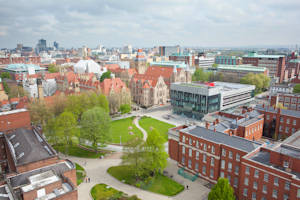Manchester responds to COVID-19 crisis
30 Mar 2020
Scientists and clinicians across Greater Manchester form rapid response research group to find ways to beat COVID-19 and save lives

In an unprecedented move, scientists and clinicians across Greater Manchester have formed a rapid response research group to find ways to beat COVID-19 and save lives.
The group will harness the power of hundreds of researchers from our University as well as clinical colleagues at Manchester University NHS Foundation Trust (MFT) and the Northern Care Alliance NHS Group.
The work is backed by Health Innovation Manchester (HInM), which accelerates research and innovation to improve the health and wellbeing of Greater Manchester’s 2.8m citizens. Further support is also being provided by the NIHR Manchester Biomedical Research Centre (BRC) and NIHR Manchester Clinical Research Facility (CRF).
Led by Professor Ian Bruce, Director of the BRC, Academic Director of HInM and a Professor of Rheumatology at MFT’s Kellgren Centre, the group’s work is focussing on:
- new treatments including antivirals, anti-inflammatory agents and others
- understanding disease mechanisms using the expertise of Manchester’s world-leading virology and inflammation/immunology teams to find out which patients acquire the virus and why some patients have a particularly aggressive illness course
- using data science, mathematics and computer modelling to identify and track patients with symptoms to focus on those who are deteriorating and who need more intensive interventions at an earlier stage
- public health and applied health researchers are working on developing and evaluating ways to reduce the impact of the virus on public health. This will relieve pressure on the NHS and social care systems because so many people are affected, especially in social care
- impact on patients with existing health conditions. Manchester researchers are leading on global efforts to track these patients
- speeding up diagnosis and testing. Researchers are working to develop and deploy rapid diagnosis testing platforms to scale-up for mass, widespread testing
- prevention/vaccination: The Greater Manchester partnership has experience of deploying clinical trials at large scale within the community.
Professor Graham Lord, Vice-President and Dean of the Faculty of Biology Medicine and Health said: “The Research Rapid Response Group brings together the research and innovation strengths of our partnerships in an unprecedented way to focus on this public health crisis.
"Our aims are to minimise lives lost and reduce the impact of the pandemic on Greater Manchester’s health and social care system and the wider community."
Sir Michael Deegan, Group Chief Executive of Manchester University NHS Foundation Trust said: “This is the most challenging time the NHS has faced. The pressure on our staff is immense and I am grateful to every single one of them, as they work day and night to provide the very best care and treatment to not just those diagnosed with COVID-19, but the thousands of other patients we are caring for with all manner of healthcare issues.
“The impact of COVID-19 on our NHS services cannot be underestimated. That’s why it’s imperative that the cutting-edge research and innovation we are proud to have at MFT joins with our academic and clinical partners across Greater Manchester to support the worldwide effort to tackle COVID-19.”
Professor Ian Bruce said: “The speed at which our scientific community has stepped up to respond to the COVID-19 outbreak is outstanding and a testament to Greater Manchester’s strong clinical-academic leadership and research assets.
“Research has a significant role in understanding more about this new disease, how to tackle it and the longer-term impact this pandemic will have on communities.”
As part of the Rapid Research Group, the partners have also organised a media response group of scientists and clinicians, who will be able to offer dependable and accurate comment to journalists and the public around the scientific and research activity taking place in this complex area.
